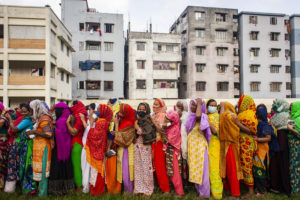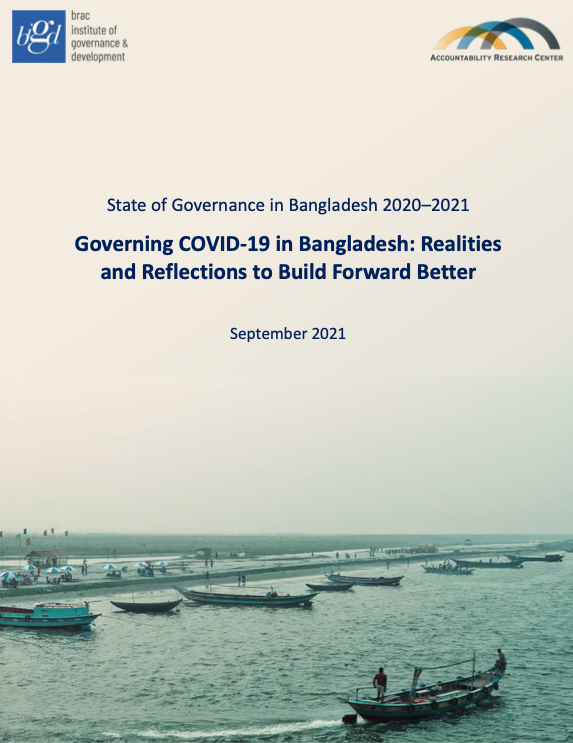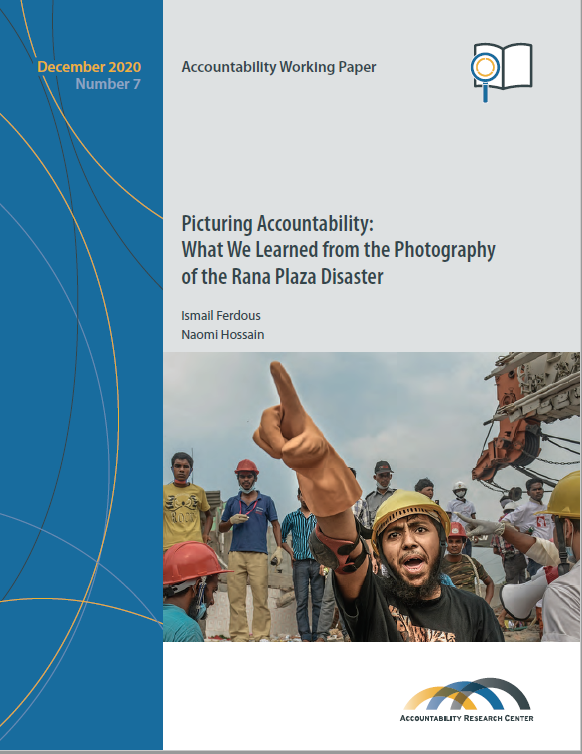Overview
Since 2019, ARC has been building partnerships with organizations that implement or research efforts to strengthen accountability to some of the most marginalized and disempowered people in Bangladesh. We work with our partners to learn how accountability can be strengthened in an uncertain context: civic space is shrinking, and civil society actors face grave risks. Yet there are signs that government wants development to succeed, and may be open to strengthening accountability to citizens.
Our partners navigate this unpredictable context to influence, monitor, and analyze government, NGO and business policies and practices. They work with social movements, membership organizations, and elite allies. They seek to understand and promote change in how government accounts to its citizens; how to make health, education, and social protection policies and programs fairer and better; and to realize the rights of women, children, minority and indigenous people, and workers in the ready-made garments industry. ARC works with our Bangladesh partners on the priorities they set, helping them identify emerging challenges and opportunities; gather the evidence needed to inform change; and share their evidence and learning.
Our Partnerships and Approach in Bangladesh
Bangladesh has a rich tradition of social and political activism, civil society mobilization, and innovative action-oriented approaches to research, which ARC aims to learn from and with. Our work in Bangladesh mainly responds to invitations from Bangladeshi organizations and researchers to collaborate, but we also seek out activists and creators who are breaking new ground in their efforts to build more accountable institutions and societies. ARC’s Naomi Hossain draws on her extensive research and civil society networks to help identify and respond to cutting-edge concerns, working with Bangladeshi activists, researchers, and policy reformers.
Our partnerships in Bangladesh have to date focused on four main thematic areas: 1) accountable public services, 2) women’s rights, 3) civil society and social movements, and 4) accountability in the apparel industry.

Members of a local government monitoring initiative organized by Rupantar (NGO) in Khulna city in southern Bangladesh.
Credit: Naomi Hossain, 2014.
1. Accountable public services
ARC has partnered with the BRAC Institute of Governance and Development (BIGD) at BRAC University on their governance monitoring work. The BIGD-ARC 2021 State of Governance in Bangladesh: Governing COVID-19 report developed a political economy framework for analyzing pandemic governance, documented the policies and programs adopted by the Government in response to the crisis, and identified priority areas and recommendations for ‘building forward better’.
ARC is also participating in the Covid-19 Learning, Evidence and Research Programme (CLEAR), funded by the UK’s Foreign and Commonwealth Development Office, and based at the Institute of Development Studies, Sussex. ARC’s study under this program, The Feedback State, asks if the Bangladesh state succeeded in listening and responding to its citizens’ needs regarding health and social protection during the pandemic, and what it learned from how it listens and responds to citizen feedback that will help it govern future crises.
Civil society participation and grievance redress mechanisms in public services and development programs are now mandated in local governance, public services and World Bank-financed programs. ARC’s Rachel Nadelman has been working with Bangladeshi partners on monitoring citizen engagement in World Bank projects, and is developing new lines of action-research related to complaint and resolution with civil society and research partners.
BIGD-ARC Report on the State of Governance in Bangladesh 2020-2021 (September 2021).
2. Women’s rights
Bangladesh has important lessons about strengthening women’s rights, but also faces continuing challenges and backlash against women’s empowerment. ARC is working with the Manusher Jonno Foundation to learn with and from their partner community-based organizations and movements about how to tackle violence against women, accountability for victims of child marriage, and build women’s collective power. ARC’s Naomi Hossain acts as a research advisor to the action-research program Sustaining Power: Women’s Struggles against contemporary backlash in South Asia. She also provides research support to the Bangladesh Legal Aid and Services Trust (BLAST) in their social and legal histories of landmark cases on women’s rights (among other issues), marking the 50th anniversary of the Bangladesh constitution in 2022.

People wait for relief aid at Shahjahanpur area in Dhaka, disregarding social distance guidelines amid the coronavirus pandemic (May 2020).
Photo credit: UN Women/Fahad Abdullah Kaizer.
3. Civil society and social movements
Bangladesh has seen many innovations in aid to civil society over the decades, and ARC has been learning with our partners the Manusher Jonno Foundation from their 20 years of financial and organizational support to over 200 NGOs, community-based groups, and social movements working on a range of human rights, inclusion, and equality issues. Watch a short film about their work on the rights of women, workers, indigenous people, people with disabilities, children, and marginalized and stigmatized communities (trans people and sex workers) – as well as transparency, citizen participation, and accountability in public life. ARC’s Naomi Hossain is also involved in broader public debates about the lessons from and future of Bangladesh’s large and effective NGOs.
4. Accountability in the apparel industry
The apparel industry has been one of Bangladesh’s success stories, but despite making major contributions to economic growth, workers’ rights remain weak. The Rana Plaza industrial disaster of 2013 spotlit the crisis of workers’ rights, drawing attention to chronically dangerous working conditions, repression of workers’ freedom to organize, and how international brands and the government were never held accountable for protecting workers’ basic rights.
In 2020, ARC worked with acclaimed photojournalist Ismail Ferdous to learn from the power of photography to help voice demands for workers’ rights in Bangladesh. In 2023, we worked with Ferdous and the BRAC Institute of Governance and Development to commemorate the tenth anniversary of the Rana Plaza disaster. This work produced a research brief in English and Bengali, a short video, and an exhibition in Washington DC and Dhaka.
In her work on corporate accountability and workers’ rights, ARC’s Judy Gearhart has been examining the role of transnational civil society action on workers’ rights in the apparel chain, working with the Bangladesh Center for Workers’ Solidarity to learn from their experiences. This research has been published in an Accountability Working Paper on transnational organizing in apparel supply chains.
Picturing Accountability explores the role of the arts and photography in accountability struggles.
Image Credit: Ismail Ferdous
Related Resources
Listening and Responding to Bangladesh’s Citizens During the Covid-19 Pandemic, report, (Zahir Ahmed, Syeda Salina Aziz, Shuvra Chowdhury, Mirza Hassan, Rafsanul Hoque, Naomi Hossain, Pranab Kumar Panday, and Marium Ul-Mutahara, 2023)
Ten years after Rana Plaza: Remembering, learning, moving forward, short video (BRAC Institute of Governance and Development, 2023)
Ten Years After Rana Plaza, research brief (Maheen Sultan, Iffat Jahan Antara, and Touhidul Islam, 2023). Bengali version.
Supporting Social Movements, report of a field practicum on behalf of the Manusher Jonno Foundation (Unwah Ahmad, Alvina Ahmed, Jonathan Blackmon, Rachel Crocker, Sadie Daugherty, Samantha Kaisesr, Bilal Rana, Kennedy O’Shea, Awrad Saleh, JohnGates Sharp and Samantha Smith, with guidance from Naomi Hossain, 2022)
Accountability and Responsiveness in Managing Covid-19 in Bangladesh, IDS Working Paper, (Shuvra Chowdhury and Naomi Hossain, 2022)
Can the COVID victims of child marriage get accountability? From Poverty to Power blog, (Shaheen Anam, 2021)
Bangladesh’s NGOs at 50: a conversation between David Lewis and Naomi Hossain (London School of Economics, 2021)
Governing COVID-19 in Bangladesh: Realities and Reflections to Build Forward Better, working paper (Dr Mirza Hassan, Dr Naomi Hossain, Sirajul Islam, Rafsanul Hoque, Insiya Khan, Syeda Salina Aziz, Avia Nahreen, Md. Mahan Ul Hoque, Dr S. R. Osmani, Dr M. S. H. Siddiquee, Maheen Sultan, Iffat Jahan Antara, Dr Shahaduz Zaman, Faruq Hossain, and Dr Imran Matin, 2021)
The Moral and Political Economy of the Pandemic in Bangladesh: Weak States and Strong Societies during Covid-19, journal article (Tariq Omar Ali, Mirza Hassan, and Naomi Hossain, 2021)
Lessons for Bangladesh’s next lockdown, LinkedIn blog (Naomi Hossain, 2021)
Picturing Bangladesh, Prothom Alo English blog (Naomi Hossain and Ismail Ferdous, 2021)
Picturing Accountability: What We Learned from the Photography of the Rana Plaza Disaster Accountability Working Paper, (Ismail Ferdous and Naomi Hossain, 2020)
Trust, Institutions, and Collective Action: Rapid Study of Community Responses to COVID-19 in Bangladesh, policy brief (Tariq Omar Ali, Mirza Hassan, Naomi Hossain, Md Mahan Ul Hoque, Md. Mamun-Ur Rashid, Imran Matin, and Mehnaz Rabbani, 2020)
Fast Research can fix government feedback loops broken by Covid – great example from Bangladesh, From Poverty to Power blog (Duncan Green, 2020)


